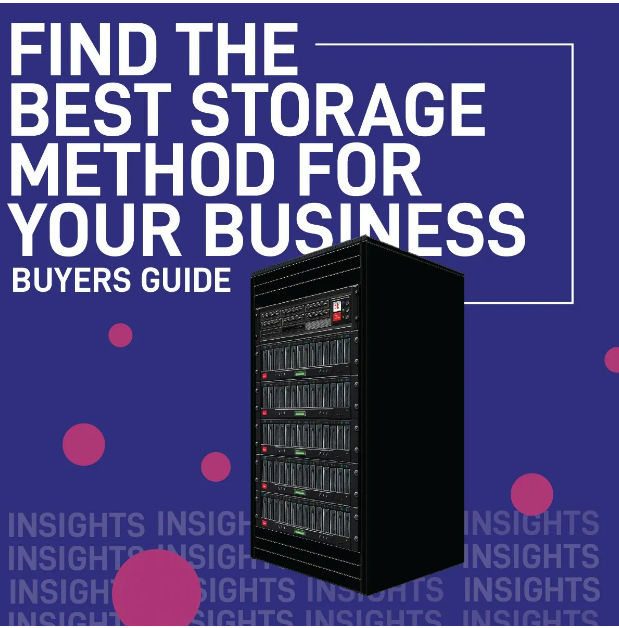A Buying Guide to Finding the Best Storage Solution for Your Business
Time to read: 15 mins
If popular comparisons are accurate, then data is a kind of new world oil. From sensitive customer or employee records to a company’s most vital assets (payroll, financial, transactional, or other confidential data, for example), having an efficient, secure, and scalable data storage method is crucial for operational longevity and success. But where do you store your growing volumes of data?
Large, messy data volumes are a challenge for educators, researchers, manufacturers, retailers, broadcasters, and those in other regulated industries like financial services or pharmaceuticals. Down-selecting the best – most scalable, cost-effective, secure – storage method can be the difference between an operationally robust company and one that’s frustrated by disruptions like data breaches, slowdowns, or legacy hardware failures.
And just like oil, data is a precious resource. That’s why many organizations are now taking extra measures to deploy a storage solution that’s just as secure as it is scalable. As your business grows, your data volumes become harder to manage smartly and within robust security perimeters. Yet, the right storage method will answer all of an organization’s needs: security can be defaulted, just as you can flex storage capacity as you grow, all-the-while remaining cost-efficient.
This comprehensive buying guide will cover everything to know about refining the best purpose-fit storage solution for your business needs.
Looking to answer a specific question? You can skip ahead to the sections that matter most to you by navigating with our sidebar. Alternatively, talk directly to one of our storage experts today by telling us more about your needs here.
Types of Data Storage Solutions, Explained
An ‘at a glance’ view of storage options reveals why many organizations might suffer marketplace confusion. Our storage experts rounded up the key types of data storage solutions – and everything you need to know about them.

1. On-Premises Storage
For businesses with specific security and compliance requirements, on-premises storage remains a viable option. This involves managing and maintaining physical servers and data storage devices within an organization’s premises. While it provides complete control over data, it requires a significant initial investment and ongoing maintenance.
2. Network-Attached Storage (NAS)
Network-Attached Storage, or NAS, devices offer centralised and easily accessible storage within a local network. They are particularly useful for small to medium-sized businesses (SMBs) that require a cost-effective solution for shared file access. NAS provides a dedicated file-sharing system and can be expanded as business needs grow.
However, it is worth noting that performance speeds can be frustrated by busy and high-activity networks. Sluggish performance rates can mean more than just slowdowns, but low productivity where organizations have high-performance applications.
Scalability in a NAS storage type can get complicated too. If your organization needs to expand its storage capacity – while possible – you will need to introduce another NAS device. Other storage solutions on the market are more easily scaled and can flex capacity when you need it.
3. Storage Area Network (SAN)
Ideal for larger enterprises, Storage Area Networks, or SAN, is a high-performance storage solution that connects multiple servers to a shared storage resource. It provides fast and efficient data access, making it suitable for data-intensive applications. SANs, however, require specialised knowledge for setup and maintenance.
3. Cloud Storage
For companies of all shapes and sizes, cloud storage is an agile option for your data. Plug, pull and platform your data easily with a cloud destination, which can make hyperscalers like Azure and AWS more attractive than traditional storage types.
Customers of cloud storage are often quick to delight in the convenience, security (as a defaulted option) and usability of this option. But, as with a strategic storage play, customers can store only certain groups of data in the cloud if they want to spread the risk and cost.
On-Premises vs. Cloud Storage
Whilst the enterprise data storage market may, at first, appear vast, it can be simplified. The data storage landscape can be broadly divided into two methods: on-premises and cloud-based solutions. Each option comes with its own set of advantages and drawbacks, requiring you to carefully consider your business’s unique needs and priorities.
On-Premises Data Storage (Taking Control of Your Data Domain)
For those who prefer the comfort of direct ownership and management, on-premises storage offers several benefits. The most significant ones, include:
- Ultimate Control: You directly manage the hardware and software, giving you granular control over security, access, and data recovery.
- High Performance: Dedicated hardware optimised for your specific needs can offer superior performance and responsiveness compared to shared cloud resources.
On-premises solutions, however, also come with many recognised challenges too, such as:
- Scalability Limitations: Expanding storage capacity often requires additional hardware purchases, leading to logistical and financial constraints.
- Added Maintenance: You become responsible for ongoing maintenance, backups, and disaster recovery planning, adding to your IT workload. This can be avoided with expert support from a Managed Services Provider (MSP), who can include ongoing storage support within the scope of a solution.
TECTRADE SAYS:
“In some instances, and depending on the agreed upon solution, a business can avoid recurring fees by fixing in a onetime on-premises storage method. But, buyer beware, where storage is fixed down like this, capacity won’t necessarily be flexible either. That means your storage capacity will not flex with your consumption over time unless your MSP plans ahead for additional space upfront.
Storage capacity is integral to any solution. From experience, Tectrade’s storage solution specialists will design solutions that flex capacity to a business’ needs. In some instances, this means allowing additional storage space so that a business can scale in the years to come. But, especially with cloud-ready companies, one step in creating cost-efficiencies is ensuring that capacity is level with business need.”
The Cloud Storage Method
Cloud storage has revolutionised the way businesses manage and access their data. These scalable, flexible cloud platforms are run by hyperscalers, including the likes of Microsoft Azure, AWS, Google Cloud Platform and IBM Cloud.
At a quick glance, cloud storage is renowned for its flexible, remote accessibility, backups, and consumption model, making it a popular choice amongst today’s most modernised businesses.
For those businesses on the storage market seeking agility and accessibility, cloud storage might just be the right platform for your data.
The popular business cases for cloud storage includes:
- Scalability: Easily adjust your storage capacity up or down to meet your evolving needs, paying only for what you consume.
- Competitive: Many other regulated industries have entrusted their data to hyperscalers, making it an obvious destination for businesses that want a more direct solution.
Cloud storage does, however, have its downsides:
- Security concerns: It’s a common misnomer that because you store data with hypercsalers like Microsoft or Amazon, that they become responsible for your data’s security. Instead, it is critical that businesses going to the cloud for storage understand their risks and roles around data security. You remain the custodians of your own data – that means, you remain responsible for keeping it backed-up, secure, and defended against breaches.
- Vendor Lock-in: At some point, especially in the enterprise market, it can become risky to lock down all your data behind one vendor, reducing flexibility. Once data is migrated, it can be costly if not complex to switch platforms.
- The Moment of Cost Inefficiencies: Storage costs are relative not only to your consumption, but your platform usage. Unpredictable monthly billing, and limited cost visibility, is not uncommon for those businesses entrusting volumes of data to cloud storage. The consumption model can work favourably, but there are plenty of precautionary stories where companies have repatriated over cloud billing frustrations.
TECTRADE SAYS:
“The anatomy of an ideal cloud storage platform looks different for everyone. But the major reason behind the mass cloud repatriation trend in 2023 came down to growing excitement around a new technology and misassumptions around digital transformation and agility.
Cost savings are only as valuable as the solution architecture: to what expense is it to reduce costs now and limit scalability in the near future? In platforms like Azure, cost optimization and visibility is the best way to predict, manage and control monthly billing.”
How to Choose the Right Data Storage Option?
Choosing the ideal data storage solution is like solving a puzzle. Each piece – your budget, security needs, data volume, and accessibility requirements – must fit together seamlessly to create an optimal picture. Here are some key factors to consider:
- Data Volume and Growth: For smaller data sets, on-premises solutions like NAS might suffice. However, as your data volume explodes, cloud storage’s scalability becomes increasingly advantageous.
- Budget Constraints: Consider the upfront investment for on-premises hardware versus the ongoing subscription fees for cloud storage. Project your future data growth to accurately estimate long-term costs.
- Security and Compliance: If your data is highly sensitive or subject to compliance regulations, on-premises storage might offer greater control and peace of mind. However, some cloud providers offer robust security features and regulatory compliance certifications.
- Accessibility and Collaboration: Cloud storage shines in remote work environments and facilitates easy data sharing, while on-premises solutions might involve physical access limitations.

Balancing On-Premises and Cloud
When the likes of Azure and AWS had their second water-cooler moment, the phrase ‘hybrid cloud’ become popular. For those uncertain, hybrid cloud defines a mixed computing environment.
A hybrid approach, whereby combining both on-premises and cloud storage, can offer ideal middle-ground for businesses that want to enjoy the best of both worlds. Your business might, for example, store its ‘crown jewel’ data on-premises for greater control and security, meeting data sovereignty challenges for example, but leverage the cloud’s scalability and accessibility when it comes to collaborating with less sensitive information.
Here’s What to Consider When Choosing a Data Storage Method
1. Scalability:
Always consider the scalability of the storage solution. What is your business’ attitude to growth and its near-future plans? Storage capacity and scalability will affect how easily (and costly) you can consume, store and secure data over time.
2. Security:
Security is paramount when it comes to data storage. Evaluate the security features of each solution, including encryption, access controls, and compliance with industry regulations. Explore data protection options – rather than looking at storage in siloes.
A compromised storage system is hard to recover, costly, disruptive and can leak confidential information, thereby losing trust from customers and employees alike.
3. Accessibility:
Determine how and where your team needs to access data. Cloud storage provides remote accessibility, while on-premises solutions offer localised control.
4. Cost:
Evaluate the total cost of ownership (TOC), considering factors such as initial setup costs, ongoing maintenance, and scalability expenses. Cloud storage often follows a pay-as-you-go model, providing cost efficiency for many businesses.
5. Reliability:
Reliability is crucial for uninterrupted business operations. Research the reliability and uptime guarantee of the storage solution you’re considering.
What to Expect from Modern Storage Methods
If you choose, for example, a storage leader in the market like IBM FlashSystems, you can expect a focus on critical areas of performance, cyber resiliency and power efficiency. The market is heading toward a future where secure, sustainable storage is everything. That means energy-efficient, high-speed, dense data storage devices that use less power but are more powerful.
The next, perhaps most important feature in storage, is building up layers of cyber resiliency. In the likely event of a cyberattack, secure storage enables faster, cleaner backups with minimised disruption or downtime.
Having a robust, reliable backup capability can be the difference between losing data altogether after a breach and having a clean, restorable version to recover from. Tectrade’s experts, working with regulated workloads, always suggest a secure-by-default approach to storage, layering in security controls to quickly mitigate risks and catastrophise like data center fires, cyber-attacks, or other forms of unscheduled downtimes.
For the complete guide on developing a resilient backup strategy, read what our experts have to say about the best laid storage strategies.

Why It Matters Where Company Data Is Stored
Whether compliance or budget limits, the places we store our critical data matters. Data regulators, as much as internal IT teams, will have insights into data storage that should influence your wider storage strategy. Yet, in many storage matters, the question about where data is stored can be divisive.
As the story of Evroc (an upcoming hyperscaler contender) demonstrates, geography can be a swinging factor in determining where data gets stored, driven by a tightening global legislative landscape. For most, however, the complication of determining where they store data goes beyond any single product too.
Storing data is just as important as securing it. Data protection, backing up data securely, cleaning your stored data – these are all part of storage best practice. Data protection and resiliency isn’t a single product either – for Tectrade it describes a means of peeling back layers of software to inform and execute a broader storage strategy around matters of compliance and security.
Let’s Find Your Storage Solution Together
Feeling overwhelmed by the storage marketplace and don’t know where to start? Partnering with a Managed Service Provider (MSP) like Tectrade can help you find confidence in how your store and secure your mission-critical data.
Partnering with an MSP can simplify your storage capability for the better. After 40 years of working on regulated, complex IT operations, Tectrade has partnered with thousands of organizations to deliver trusted, market-leading storage solutions.
Our expertise helps clients to go further with data storage:
- Analyse your unique needs and identify the optimal storage solution.
- Implement and manage your chosen storage system efficiently.
- Develop secure data backup and disaster recovery plans.
- Provide ongoing support and maintenance to ensure smooth data operations.
Build and deploy a best-practice, cost-efficient and resilient storage solution with our experts today. We offer no-obligation discussions with our storage experts, whether you want to find out more about a storage product, need to understand how to overcome a compliance challenge, or have questions about data protection strategies. Get in touch to find out more about how we can help your business.
About the author
Read more like this

Storage and Backup
A Buying Guide to Finding the Best Storage Solution for Your Business
Find the right storage solution for your company.
IBM Power
The IT Skills Gap Is Only Getting Wider in 2024
The IT skills gap is forecasted to widen in 2024 – especially for IBM i skills, what happens next?

About Tectrade
Tectrade Change Freeze (Dec-Jan)
We will be operating a ‘Change Freeze’ across our hosted and managed infrastructure to manage risk at this critical time.
